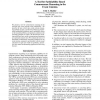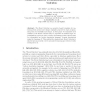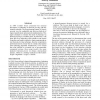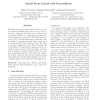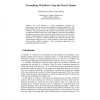119
Voted
SLP
1994
15 years 3 months ago
1994
We consider a hierarchy of modal event calculi to represent and reason about partially ordered events. These calculi are based on the model of time and change of Kowalski and Sergo...
117
Voted
FLAIRS
2004
15 years 3 months ago
2004
We present a tool for commonsense reasoning in the classical logic event calculus using satisfiability. We describe the tool, which takes event calculus reasoning problems as inpu...
127
Voted
ICLP
1995
Springer
15 years 6 months ago
1995
Springer
Abstract. The Event Calculus is a narrative based formalism for reasoning about actions and change originally proposed in logic programming form by Kowalski and Sergot. In this pap...
104
click to vote
ECAI
1990
Springer
15 years 6 months ago
1990
Springer
The Event Calculus of Kowalski and Sergot only deals with discrete change. This paper introduces a simplified version of the Event Calculus and extends it to deal with continuous ...
129
Voted
TIME
1994
IEEE
15 years 6 months ago
1994
IEEE
Pinto and Reiter have argued that the Situation Calculus, improved with time handling axioms, subsumes the features of linear time temporal formalisms such as Event Calculus and I...
121
Voted
ECP
1997
Springer
15 years 6 months ago
1997
Springer
In 1969 Cordell Green presented his seminal description of planning as theorem proving with the situation calculus. The most pleasing feature of Green's account was the negli...
125
Voted
TIME
1997
IEEE
15 years 6 months ago
1997
IEEE
Kowalski and Sergot’s Event Calculus (EC) is a simple temporal formalism that, given a set of event occurrences, allows the derivation of the maximal validity intervals (MVIs) o...
102
click to vote
DEXA
2000
Springer
15 years 6 months ago
2000
Springer
The event calculus is a logic programming formalism for representing events and their effects especially in database applications. This paper presents the use of the event calculus...
118
click to vote
POLICY
2004
Springer
15 years 7 months ago
2004
Springer
As the interest in using policy-based approaches for systems management grows, it is becoming increasingly important to develop methods for performing analysis and refinement of p...

